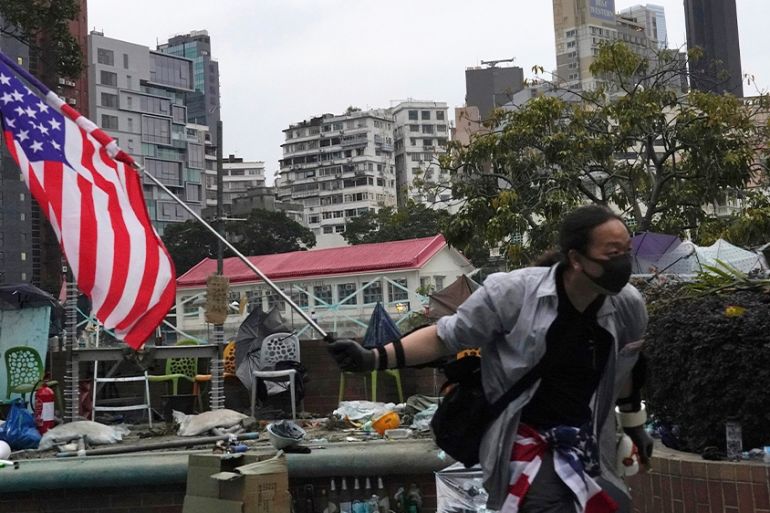‘Clear message’: US Senate backs Hong Kong human rights bill
China condemns passage of bill and says US should stop interfering in affairs of Hong Kong and China.

The Senate in the United States in a unanimous vote passed legislation on Tuesday aimed at protecting human rights in Hong Kong amid increasing violence in the self-governing Chinese territory, which has been wracked by protests since June.
The Hong Kong Human Rights and Democracy Act now goes to the House of Representatives, which earlier approved its own version of the measure. The two chambers will have to reconcile the two bills into a single measure that can pass Congress and be sent to President Donald Trump for approval.
Keep reading
list of 2 items‘Blunt, unplanned’: Police tactics under fire in HK protests
The Senate passed a second bill, also unanimously, that would ban the export of tear gas, pepper spray, rubber-coated bullets and other munitions to Hong Kong’s police force.
There was no immediate response from the White House, which has yet to say whether Trump would sign or veto the bill. A US official said recently that no decision had been made.
That official, who spoke on the condition of anonymity, said if the measure gets to Trump’s desk there would probably be an intense debate between Trump aides worried that it could undermine trade talks with China and those who believe it is the time to take a stand against China on human rights and Hong Kong’s status.
China’s Foreign Ministry and the Hong Kong government condemned the legislation.
“(The bill) neglects facts and truth, applies double standards and blatantly interferes in Hong Kong’s internal affairs and China’s other internal affairs,” the Foreign Ministry said.
Al Jazeera’s Andrew Thomas, reporting from Beijing, said China aimed to appeal to Trump.
“Beijing knows that this act has not become law,” Thomas said. “It needs to go to the president and China is trying to head that off through a mix of condemnation and threat.”

Sanctions risk
The protests in Hong Kong were sparked by a now-abandoned extradition bill that would have allowed people to be sent to mainland China for trial.
More than a million people marched through the streets in opposition to the bill, but as the weeks have turned into months the movement has evolved into a broader campaign for democracy including universal suffrage and an independent inquiry into alleged police brutality.
The Senate “sent a clear message to Hong Kongers fighting for their long-cherished freedoms: We hear you, we continue to stand with you and we will not stand idly by as Beijing undermines your autonomy,” Republican Senator Marco Rubio said.
The demonstrators are angry at what they see as Chinese meddling in the freedoms promised to Hong Kong when Britain returned the territory to Chinese rule in 1997.
As he headed to a NATO meeting in Brussels, US Secretary of State Mike Pompeo on Tuesday reiterated the need for a political resolution to the unrest.
“We continue to urge everyone to do this peacefully,” he said. “There is a political resolution of this that is achievable, we hope that’ll be the path forward.”
Senate aides said they expected the legislation would eventually move forward as an amendment to a must-pass defence bill, the National Defense Authorization Act, expected to go through Congress later this year.
Under the Senate bill, Pompeo would have to certify at least once a year that Hong Kong retains enough autonomy to qualify for special US trading consideration that bolsters its status as a world financial centre.
It would also provide for sanctions against officials deemed responsible for human rights violations in Hong Kong.
“We have sent a message to President Xi (Jinping): Your suppression of freedom whether in Hong Kong, in northwest China or in anywhere else, will not stand,” Senate Democratic Leader Chuck Schumer said after the bill was passed. “You cannot be a great leader – and you cannot be a great country – when you oppose freedom, when you are so brutal to the people of Hong Kong, young and old, who are protesting.”
‘Strong indignation’
Xinjiang, in Northwest China, is home to the mostly Muslim Uighurs, many of whom have been detained in what China says are vocational training centres, but which the US has called “concentration camps.”
China’s Foreign Ministry said this month that China had lodged “stern representations” with the US about the legislation and urged that it not be passed into law, saying it would not only harm Chinese interests and China-US relations, but the US’s own interests too.
It said China would “inevitably take vigorous measures to firmly respond, to staunchly safeguard our sovereignty, security and development interests.”
Trump prompted questions about his commitment to protecting freedoms in Hong Kong when he referred in August to its mass street protests as “riots” that were a matter for China to deal with.
Trump has since called on China to handle the issue humanely while warning that if anything bad happened in Hong Kong, there could be consequences for talks to end a trade war between the world’s two largest economies.